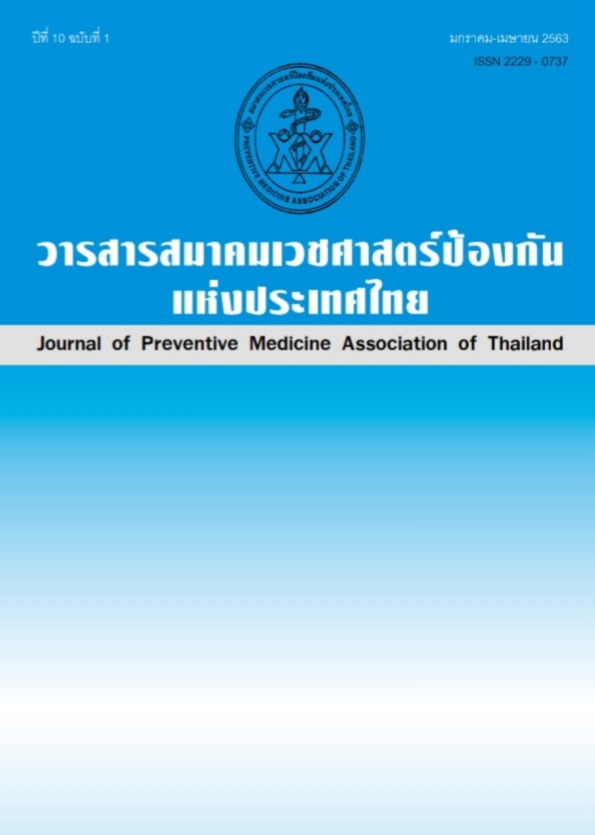Error in Estimation of 24-Hour Urine Protein Using Protein to Creatinine Ratio in Chronic Kidney Disease Patients
Keywords:
Measurement error, Proteinuria, Chronic kidney diseaseAbstract
Urine protein to creatinine ratio (UPCR) is commonly used to estimate 24-hour urine protein (24hrUP). However, in our practice, we observe the discrepancy between both indices. This study aims to find an error in estimation of 24hrUP using UPCR. A cross-sectional study was conducted in Thammasat University Hospital during December 2016 and November 2017. Chronic kidney disease (CKD) patients were enrolled. All patients were measured proteinuria by 24-hour urine collection and UPCR using a standard method. Inadequate samples were excluded. We compared both indices using Pearson correlation. Bland and Altman plot was used to determine an agreement with pre-defined acceptable different range of ± 0.5. Furthermore, UPCR was stratified into subgroups to find the most reliable range to estimate proteinuria using linear regression models. Sixty-six of total 147 CKD patients were included for analysis. The main reason for exclusion was inadequate 24-hour urine collection (44% of complete urine examination). Mean age (SD) was 60.4 (15.0) years, 63.6% were male, and one-third had diabetes kidney disease. Mean estimated GFR (SD) was 58.7 (30.3) ml/min/1.73m2. We found a high correlation between 24-hour urine protein and UPCR (r = 0.86; p < 0.001). Linear regression showed that the range of UPCR with the highest agreement with 24hrUP was between 0-2, with equation: 24hrUP = 0.99 * UPCR - 0.01. Systematic uptrend of error was observed when UPCR was more than 2. UPCR is highly correlated with 24hrUP. We suggest the most reliable range of UPCR used to estimate 24hrUP is ≤ 2. UPCR of more than 2 overestimates 24hrUP.
References
2. คณะกรรมการพัฒนาระบบบริการที่ตอบสนองต่อปัญหาสุขภาพที่สำคัญ (สาขาไต). แนวทางพัฒนาระบบดูแลสุขภาพสาขาโรคไต: นนทบุรี: สำนักบริหารการสาธารณสุข สำนักปลัดกระทรวงสาธารณสุข; 2556.
3. Ginsberg JM, Chang BS, Matarese RA, Garella S. Use of single voided urine samples to estimate quantitative proteinuria. N Engl J Med 1983;309:1543-6.
4. Christopher-Stine L, Petri M, Astor BC, Fine D. Urine protein-to-creatinine ratio is a reliable measure of proteinuria in lupus nephritis. The Journal of rheumatology 2004;31:1557-9.
5. Teo BW, Loh PT, Wong WK, Ho PJ, Choi KP, Toh QC, et al. Spot urine estimations are equivalent to 24-hour urine assessments of urine protein excretion for predicting clinical outcomes. Int J Nephrol 2015;2015:156484.
6. Morales JV, Weber R, Wagner MB, Barros EJ. Is morning urinary protein/creatinine ratio a reliable estimator of 24-hour proteinuria in patients with glomerulonephritis and different levels of renal function? J Nephrol 2004;17:666-72.
7. Hebert LA, Birmingham DJ, Shidham G, Rovin B, Nagaraja HN, Yu CY. Random spot urine protein/creatinine ratio is unreliable for estimating 24-hour proteinuria in individual systemic lupus erythematosus nephritis patients. Nephron Clin Pract 2009;113:c177-82.
8. Leung YY, Szeto CC, Tam LS, Lam CW, Li EK, Wong KC, et al. Urine protein-to-creatinine ratio in an untimed urine collection is a reliable measure of proteinuria in lupus nephritis. Rheumatology 2007;46:649-52.
9. Solorzano GT, Silva MV, Moreira SR, Nishida SK, Kirsztajn GM. Urinary protein/creatinine ratio versus 24-hour proteinuria in the evaluation of lupus nephritis. J Bras Nefrol 2012;34:64-7.
10. Zhang Q, Sun L, Jin L. Spot urine protein/creatinine ratio is unreliable estimate of 24 h proteinuria in lupus nephritis when the histological scores of activity index are higher. Lupus 2015;24:943-7.
11. Micco LD, Quinn RR, Ronksley PE, Bellizzi V, Lewin AM, Cianciaruso B, et al. Urine creatinine excretion and clinical outcomes in CKD. Clini J Am Soc Nephrol 2013;8:1877-83.
12. Chen CF, Yang WC, Yang CY, Li SY, Ou SM, Chen YT, et al. Urinary protein/creatinine ratio weighted by estimated urinary creatinine improves the accuracy of predicting daily proteinuria. Am J Med Sci 2015;349:477-87.
13. Shaw AB, Risdon P, Lewis-Jackson JD. Protein creatinine index and Albustix in assessment of proteinuria. Br M J 1983;287(6397):929-32.
Downloads
Published
How to Cite
Issue
Section
License
บทความที่ลงพิมพ์ในวารสารเวชศาสตร์ป้องกันแห่งประเทศไทย ถือเป็นผลงานวิชาการ งานวิจัย วิเคราะห์ วิจารณ์ เป็นความเห็นส่วนตัวของผู้นิพนธ์ กองบรรณาธิการไม่จำเป็นต้องเห็นด้วยเสมอไปและผู้นิพนธ์จะต้องรับผิดชอบต่อบทความของตนเอง






